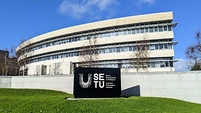Denis O’Brien appeals High Court's €823,500 defamation award to Belfast solicitors

High Court reporters
Denis O’Brien is expected to appeal a High Court jury’s combined award of €823,500 to two lawyers the businessman defamed in a 2016 press release, the court has heard.
Last week, the jury found that Mr O’Brien and his long-time spokesman James Morrissey defamed Darragh Mackin and Gavin Booth in the statement that implied the solicitors acted for the IRA.
Mr O’Brien and Mr Morrissey were ordered to pay the lawyers €411,750 each to compensate for the damage done to the solicitors’ reputations arising from the defamation. The jury’s award of damages fell within the category for “very serious” instances of defamation.
The solicitors, partners at Belfast firm Phoenix Law, brought the proceedings against Mr O’Brien and Mr Morrissey, complaining of a sentence in the statement that read: “Sinn Féin/IRA certainly got the report they paid for.”
Mr O’Brien made the statement in response to a report on media ownership in Ireland. Mr Mackin and Mr Booth were credited as co-authors of the report, which was commissioned by then Sinn Féin MEP Lynn Boylan.
At the time of the report, Mr O’Brien owned substantial stakes in Irish media companies.
On Friday, Darren Lehane SC, appearing for the defendants with barrister Joe Holt, and instructed by Meagher Solicitors, told Mr Justice Tony O’Connor that his clients intend to appeal the jury’s award of damages to the Court of Appeal.
Mr Lehane said he was applying for a stay in respect of the jury’s award of damages.
Setting out the appeal in general terms, Mr Lehane said the jury’s award of general damages – €270,000 to each solicitor – was at the “very top of the scale”.
According to Supreme Court guidelines, awards of between €200,000 to €300,000 are reserved for “very serious” instances of defamation. A jury should only award more than €300,000 in exceptional cases.
Mr Lehane said their appeal would contend that, having regard to the evidence before the jury, the award shouldn’t have been at the range it was at.
Mr Lehane said the jury’s award of aggravated damages – €141,750 to each solicitor – was “objectively disproportionate” because it represented a 52 per cent increase in the total award.
Mr Lehane noted that the jury’s award was one of the largest payouts in a defamation case in recent years.
Counsel said they had a bona fide appeal and were entitled to ask for a stay.
Tom Hogan SC, appearing for the solicitors with barrister Conan Fegan, and instructed by Johnsons Solicitors, noted that the focus of the appeal will be on the jury’s award. He said he welcomed the defendants’ acceptance of the defamation.
Mr Hogan opposed the application for a stay and said the test for setting aside a jury’s award was “a very high bar”. Counsel said Mr O’Brien’s side must convince the Court of Appeal that no reasonable jury should have made such an award.
Mr Hogan submitted that the chances of the appeal against the general damages award succeeding were slim. The appeal would suggest that saying someone worked on behalf of the IRA was not a serious defamation, he submitted.
He also opposed the contention that there were grounds to appeal the award of aggravated damages, pointing to the manner in which the defence was run.
Mr Hogan submitted that prior to the appeal, his clients should each be paid €300,000 arising from the award of damages, and a similar amount in legal costs. He said the legal costs in the case were “obviously very significant”.
Responding, Mr Holt said a payment of €300,000 would represent about 72 per cent of the overall award – a figure “way out of line” when compared with other cases.
Mr Holt submitted that if his clients are successful, the costs of the appeal would offset the costs of the High Court action.
Mr Justice O’Connor granted a stay on the execution of judgment against the defendants, but directed that they pay the solicitors €211,750 each within 28 days. The judge refused a stay on legal costs.
The judge said the defendants accept that they defamed the solicitors, and the jury’s verdict should not be “diminished” in any way. He said the best way forward was to grant the stay sought with the condition of a payout.






